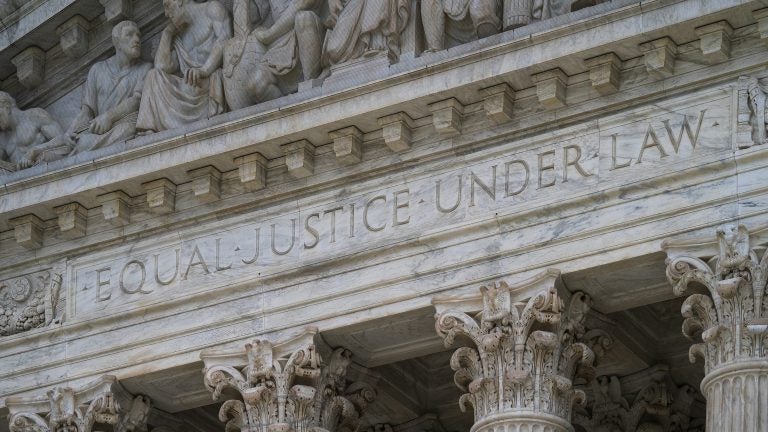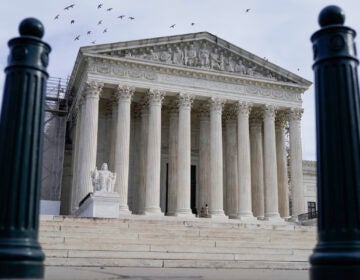Biden’s Supreme Court pledge highlights the stain of race and gender bias on America’s judiciary
Black women have a legacy of proficiency in the law. Claims that their paucity in the federal judiciary is due to incompetence are fraudulent, writes Linn Washington Jr.

The motto "Equal Justice Under Law" adorns the Supreme Court building in Washington. (J. Scott Applewhite/AP)
Mary Shadd Cary, the second Black female law school graduate in America, was born in Wilmington, Delaware, the city that President Joe Biden calls home. Cary graduated in 1883 from Howard University’s Law School in Washington, D.C.
Cary and a few other Black women graduated from law schools in the late 19th century during an era when the U.S. Supreme Court actively sanctioned racism across America. One of those Black graduates even became the first woman of any race to teach at a law school.
Biden’s pledge to replace retiring Justice Stephen Breyer with a Black woman would be a first for that judicial body if Biden’s nominee is confirmed by the U.S. Senate. The only people of color to serve on the nation’s highest court, established in 1789, is one Latina woman and two Black men.
Biden’s intention for the Supreme Court inadvertently highlights how racism and gender bias stain America’s judiciary, the institution tasked with the critical duty of ensuring justice for all.
Historically, America’s judiciary — federal and state — has been overwhelmingly white and male. Evidence of racial and gender disparities include the fact that, currently, less than 5% of all federal judges are Black women.
Biases embedded in America’s legal system are a factor for why the first Black woman did not become a federal judge until 1966. The first Black woman did not serve on a powerful federal appeals court until 1979, nearly a century after Cary’s law school graduation. And it was May 2000 before the first Black woman joined the federal District Court bench in Philadelphia, the city with the distinction as the birthplace of democracy in America.
Biden recently nominated a Black woman to join the Third Circuit federal appeals court headquartered in Philadelphia — another “first.” Interestingly, the Third Circuit is where William Hastie began service in 1949 as the first Black federal appellate judge.
An often-overlooked facet of the legal system is the inhospitable impact gender bias creates for women — lawyers and judges — of all races. The Supreme Court in 1873 ruled that women were unfit to work as lawyers because their “noble and benign” roles were that of wife and mother. Justices even defended that assessment as “the law of the Creator.”
The first woman did not join the Supreme Court until 1981. Then-President Ronald Reagan fulfilled his campaign pledge to place a woman on that court. Conservatives applauded Reagan’s nomination of a woman. Yet today, conservatives bash Biden for his campaign pledge to nominate a (Black) woman to the Supreme Court.
Given the fact that Black women have a legacy of proficiency in the law, claims that the paucity of Black women in the federal judiciary arises from their lack of competence is fraudulent.
In 1791, Lucy Terry Prince, a non-lawyer and freed slave, became the first Black woman to successfully argue a case before a Supreme Court Justice. Prince’s powerful presentation in a dispute over land she and her husband owned in Vermont led then-Supreme Court Justice Samuel Chase to credit her as better than any Vermont lawyer he ever heard.
Constance Baker Motley, the first Black female federal judge, argued 10 cases before the Supreme Court as a lawyer, winning nine. Motley, an Ivy League law school grad, assisted on nearly 60 other cases that reached the Supreme Court. Motley began her legal career as a lawyer for the NAACP Legal Defense Fund where her mentor was the legendary Thurgood Marshall, the first Black man to serve on the Supreme Court.
The NAACP Defense Fund’s campaign against legalized segregation included lawsuits that ended discriminatory exclusion at many law schools.
Little is known about the legal career of Mary Shadd Cary, a lifelong activist for civil rights and women’s rights who died in 1893. Cary is better known by the “first” she achieved 30 years before her law school graduation. She became the first Black woman to found and operate a newspaper anywhere in North America.
A line from a letter Cary wrote in 1848 has resonance today for efforts to increase the number of Black women at all levels of the federal judiciary. If America is truly a nation of equal justice and equal opportunity, then, as Cary wrote, “We should do more and talk less.”
—
Linn Washington Jr. is a journalism professor at Temple University. He is the author of “Black Judges On Justice,” the first book to present in-depth interviews with Black jurists.

Show your support for local public media
WHYY is your source for fact-based, in-depth journalism and information. As a nonprofit organization, we rely on financial support from readers like you. Please give today.





